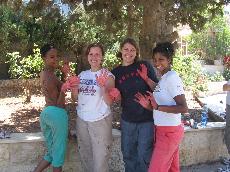Sweaty and tired, the Guilford students shaded their eyes and peered up at the iron grating casting a checkered shadow over the dusty market streets of Hebron. The grating, their guide informed them, was put up to prevent Israeli workers on the buildings above from throwing trash and rocks on the Palestinian passersby below.
“Don’t look up!” he warned. “They’ll throw sand in your eyes.”
Welcome to the second holiest city in the world, where peace seems eternally elusive.
*
Approximately thirty miles away, in the more liberal and protected city of Ramallah, a small oasis of calm exists in the form of the Friends Boys’ School, founded in 1901 by an intrepid group of Quakers.
The Boys School served as a home base for the Guilford group during a two-week work-study trip in Israel and Palestine this July.
The group, a fairly large one, consisted of sophomores Kelsey McNicholas and Pauravi Shippen-How, senior Cully Salehi, as well as recent graduate Genoa O’Brien, board member Ellen Hamrick, community member Nary Nelle Smith, Kennesaw State professor Maia Carter and son Graham, oil investor Bill Deichler, and Campus Ministry Coordinator Max Carter.
From the Boys’ School in Ramallah, the group took day trips to cities such as Jerusalem, Bethlehem, Caesarea, and Qumran.
The days were long, and temperatures climbed past the nineties.
“If you think it’s hot in here, you should have been in the middle East this summer,” joked Carter to a bevy of listeners at the Sept. 9 Eyewitnesses to Israel & Palestine discussion.
Temperatures weren’t all the group found trying during the course of their visit.
“There’s a limited amount of water in Palestine, especially in those areas that are controlled by Israel,” Salehi said. “You can see how much water you have left, and then once you’re out, you’re out. That’s it for the week. Imagine having to decide between taking a shower and washing dishes.”
In Israeli settlements, McNicholas said, the water situation is not as dire as it is for Palestinians.
“Some of them [Israelis] will come and put dead animals and so on into the community water supply, and then-I mean, what do you do, if there’s nothing else?”
*
Though the students may be new to the Middle East experience, Max Carter isn’t.
“Since 1997, my wife Jane and I have led work study-trips to the Middle East and over the years have developed a pattern of working at the Ramallah Quaker School studying the conflict, making connections with Israelis and Palestinians involved in the search for peace,” Carter said at a colloquium in 2005.
Every year, Guilford students are shocked and fascinated by the juxtaposition of ancient temples and sprawling graffiti, of millennia-old olive trees and slick padlocked fences.
They return bursting with the impetus to inform the world of what they have witnessed.
In Boren Lounge on Sep. 9, the audience listened quietly as Shippen-How spoke about each of the people now appearing on the screen behind her. Salehi, stopping at a picture of a Palestinian speaker, explained that he was discussing Israeli border control.
“They only let in Israeli products, so it will channel money to Israel,” she said.
“This is the only thing people over there asked,” McNicholas said. “For all their hospitality and generosity, all they wanted was for us to tell their story.”
*
The three students – McNicholas, Salehi, and Shippen-How – and Carter told story after story of their trip to the Middle East.
A dead chicken thrown into a community water source. Checkpoints throughout Palestinian cities. A firm chokehold on the Palestinian economy.
Nearly all of the problems they described are impossible for a small group of students to solve.
The question becomes: what can one do in the face of such a daunting task, that is, ameliorating the situation in the Middle East?
At the Ramallah Friends Boys’ School, one does whatever one can to help, whether that means painting tables, washing dishes, or cleaning floors.
Towards the end of the PowerPoint, an image of McNicholas mopping industriously appeared on the screen.
“Bringing peace to the Middle East-one mop at a time!” Carter said.
The Eyewitness to the Middle East lecture series will continue through this week, with locations and times announced on fliers in Founders Hall.

